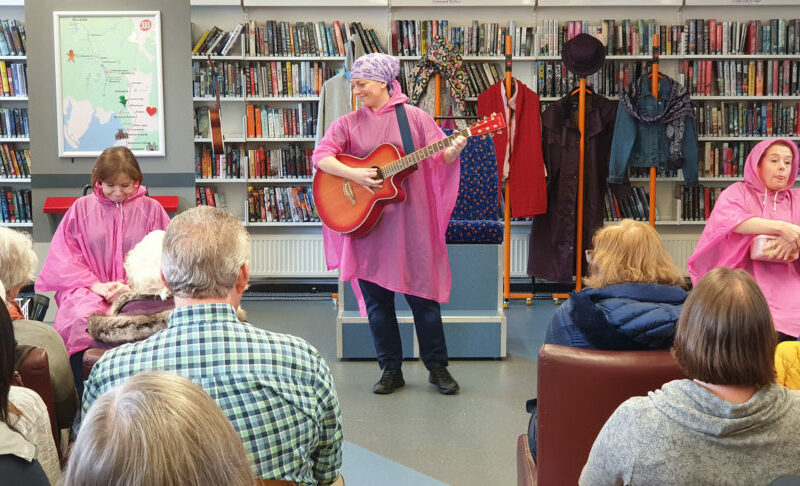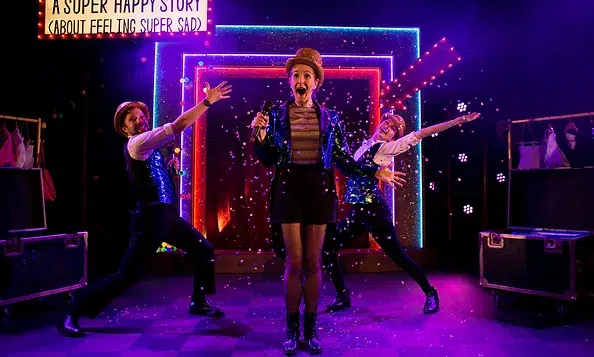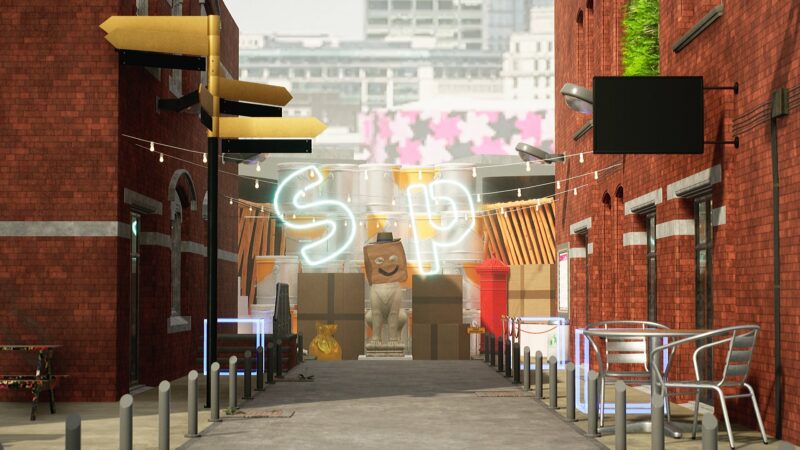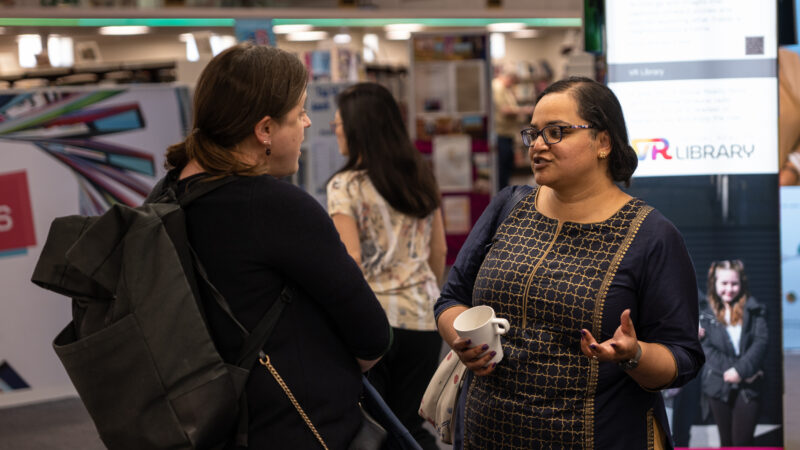Conversations and advice
In our latest podcasts, we are looking at the way artists and organisations can use digital when working with communities.
The appetite for working with communities, rather than for them is becoming ever more important. Let’s Create, ACE’s 10-year strategy, prioritises inclusivity and relevancy as a core principle, with the aim of delivering greater access, fairness and opportunity for everyone.
In these ‘cup of tea conversations’ we speak to artists and organisations whose work has community at heart and discuss what makes their approach successful, how they use digital, and how the work is evolving. Each episode lasts around 20 minutes and takes the form of a conversation over a lovely cuppa.
Below is the transcript for the third and final of these conversations, with Robert Howell of Culturepedia.
Robert Howell, Cultrapedia
Robert Howell is from Lancashire-based Culturapedia. The organisation engages its audiences in cultural offerings online, outdoors and on their doorsteps. Robert talks about building communities, working in micro communities and the importance of community ownership.

Speakers
Robert Howell (Culturepedia), Rob Lindsay (Head of Programmes, The Space), Clare Freeman (Podcast Producer)
Clare Freeman, podcast producer 0:03
Hey, I’m Claire, great to have you back, is your brew in hand? Perhaps you’re letting your teabag stew or waiting a few moments before plunging the cafetiere. Well, let me introduce you to today’s cup of tea conversation. Robert Howell is from Culturepedia, an arts and cultural organisation, which aims to put Lancashire on the map, be that through short films, their digital programme and rural touring. The conversation you’ll be hearing is taken from our webinar series, which you can also watch online, visit the thespace.org or check out the show notes to find out more. Anyway, in this episode, Robert talks about how he’s learned to measure success during a digital project. His understanding of what digital poverty really means and how to embrace technology, especially video conferencing. He’s been speaking to Rob Lindsay, Head of Programmes at The Space. To kick off Robert started explaining to Rob what Culturepedia’s is repertoire involves.
Robert Howell 1:12
We’re based in Lancashire, [where] all our engagement happens. Lancashire’s a big place, population of almost one and a half million. So you know, we’re just a small brick in that wall. What we focus on is effectively community curated content, and which is mainly professional performing or visual arts but curated by the people of Lancashire or our, sort of, non-geographic community of artists. We work with artists from all over the world. So that would include things like we run the rural touring the scheme for Lancashire. So we take professional performing arts to village halls and community spaces in rural areas, that’s called Spot On Lancashire, that’s been going for…well, that had its 25th birthday in the middle of lockdown, so we weren’t able to celebrate it really. But the moment’s passed now, we’ll have to wait for the 30th. We also do a similar programme in libraries in Lancashire, where we put professional performing arts into libraries. We run a literary festival called the Burnley Words Festival, or that’s going to be called the Burnley Words Festival in Burnley. We’re doing other work with other projects, like markets in Bacup, Haslingden, Blackburn, Darwin, and various activities around the place.
Rob Lindsay 2:35
That’s fantastic. I think it’s really notable that in the work that you do, you’ve got almost two communities, you’ve got your audience community, and you’ve got your community of artists as well. And you mentioned a moment ago, you just said your 25th year anniversary. Can I ask you a bit about that length of time, about how long have you been working with these communities? Because I think sometimes the time it takes to build a community, I think sometimes gets forgotten, it feels like.
Robert Howell 3:03
Absolutely 100%. I think that we are very much embedded here in Lancashire and have been working with a lot of communities for a long time. But it’s amazing how many people still come up and [say], “I’ve never heard of you, what you doing?” I mean, Lancashire’s a big place. And what we tend to do is working in those micro communities. So unless you’re part of one of those micro communities, chances are you won’t have come across us. I think our ethos very much, and this relates to the question for Jan as well, is that we push at open doors. Whereas, you know, a good geographical spread of our work is really important, we don’t try and contrive relationships with communities. So a good example of this is the library service, who in Lancashire are fantastic. And we’ve been working with for about nine years really closely in terms of putting professional performing arts into libraries. We started off by saying, which librarians want to play, who is keen on being involved in this and engaging in this, rather than someone on high, sort of, looking at a map and thinking, “oh no, strategically, we need something there.” So it’s very much about ownership. And it’s really important that those people have ownership. But like I say, It’s about pushing at open doors, and it does take a long time. And it takes a lot of conversation and a lot of cake.
Rob Lindsay 4:37
Fantastic. Thank you. Yeah, I really love that idea of, and again similar to what Jan was saying earlier on, that idea of occasion, you may go in and go, “oh, you should work with those people.” You know, networks already exist. People are already out there, communities already exist. And I think it is very, very important that when we talk about building a community that often will overlap with existing communities and we do need to be respectful of those, beginning to listen to those as well.
Robert Howell 5:04
And use those connections and those links sometimes. So I think that’s great when you can sort of step into a, sort of, ready-made group.
Rob Lindsay 5:17
Yes, yes. I’m aware then that you’ve got these different overlapping audiences, because you will have your community of artists, you’ll have your community of audiences. They’re probably a Venn diagram, there are probably artists from the audience for other artists’ work. I think when we talk about digital communities as well, that’s probably another circle. Not everyone will be in that. And it will also include some that aren’t necessarily seen as part of the other groups as well. Do your mind if I ask a little bit about, you’ve talked there about operating over a wide area, can I ask you a little bit about the digital divide in your area, and how that impacts upon any kind of digital community work?
Robert Howell 5:54
Yeah, I think…I mean, we’ve been learning a lot about that digital divide, and about digital poverty here in Lancashire. And when I say digital poverty, I don’t necessarily mean financial poverty. It is amazing how, I mean, I’m in Blackburn, with a population of over 100,000. So it’s a big town. But the mobile phone signals in Blackburn are pants, because they’ve just not been invested in. And there’s an awful lot of rural Lancashire, where, you know, if you’re lucky enough to have broadband, it’s surviving on a rather worn out hamster and a rubber band. So there’s no way you can access video content without it buffering every three seconds. That is a real issue here for a lot of Lancashire. I mean, and there is there is also the other type of digital poverty of people not having the money to have the devices or not having enough devices in the home and things like that. And in addition to that, there’s a lot of people who’ve just not got there yet.
Rob Lindsay 7:07
Yeah, yeah, absolutely. Do you mind if I ask you as well, a little bit about what you know about audiences. I know that when you and I were chatting the other day, we were talking about, community building often comes from…you had a fantastic quote about, “rural touring being art that happens…”
Robert Howell 7:26
Yeah, it’s, “the art that happens either side of the interval.”
Rob Lindsay 7:30
That was it. That was it. That idea of community building very much being about, it’s not just about the art, that gap isn’t just there to give everyone a breather and change the sets around, that is part of the experience.
Robert Howell 7:43
Very, very much so. I mean, what we do, I mean, I can’t take credit for that quote, it’s from Francois Matarasso. What we do is we take the artists to the audience, and just as a slight aside, I think that one of the reasons we do that is that in somewhere like Lancashire, I mean in Lancashire, levelling-up is a big, big agenda at the moment. And from the Arts Council’s point of view, Lancashire, almost entirely needs levelling-up, apart from the affluent Ribble Valley, which has mainly got sheep. And so we take the artists to the people, because they’re not in the habit of accessing professional art. But the difference is that the artists are visiting those communities. So they go to a village, or they go to a library in a small town, and the audience will know each other. I mean, if we were all to go to a big theatre in a big city now, as wonderful as that would be, it would almost feel like we were visiting the artist. And we probably wouldn’t know many other people in the audience. Whereas, in the context of what we’re doing the audience all know each other. So that social interaction is really important. And it’s an excuse for social interaction, if they get to see some great art along the way, then that’s fabulous. But the benefit of that community and building social capital is vital in what we’re doing. I mean, that’s a lot more challenging with digital audiences.
Rob Lindsay 9:08
That’s exactly what I was gonna ask, about your experience of, you know, if all you have is data…
Robert Howell 9:14
One of the things that we’ve really learned as well, through doing the digital stuff is just how much we value that sort of grey observational data, and how, to us, that’s much more important than what the audience agency would have us collecting. So seeing an audience and seeing the smiles on their faces, and hearing those sort of throwaway comments, seeing the whites of their eyes seeing their tears if they’ve been crying. That doesn’t come across in a questionnaire and it certainly doesn’t come across in the same way in comments on social media. And we really miss that with the digital and I have no idea how you could even start to get that. But with social media, you’ve got these great, sorry, with with digital work, you’ve got things like YouTube or Facebook, almost like gatekeepers between us and the audience, you know? And we put it out on their platform, and they send it off to the people. And then they tell us 342 people watched this more than 10 seconds, or whatever it happens to be. And that really doesn’t tell us very much. I mean, I do the same, I watch things online and I think, Oh, that was great. That was fantastic. But I don’t always feed back.
Rob Lindsay 10:30
Yes, yes. It’s interesting as well, I think for any of us here who ever took part in any online forums, or message boards, or things like that, you often saw that you might have a message board that was being followed by 600 people, and it was the same sort of 12 to 15 of them that were doing most of the comments. You know, it was that kind of idea, that those sorts of things do often skew one way or another. Yes, I think it’s also worth acknowledging they are…again, you talk about the grey data that you get in these conversations, people being in spaces, and it is important to realise that a community is made up of probably 50, or 60 different types of interaction. Probably more, probably hundreds or thousands of different types of interaction as well. And it’s difficult to try and measure that, there are limitations on what we do. And we have to work within those limitations in order to find what we can.
Robert Howell 11:21
We do, we do absolutely. In some ways, it means that putting the digital stuff out, it’s still worth doing, because we still know lots of people are accessing it. And we still know that some of those are people who we encounter for other work we’re doing, and some are completely new to us. And we might get crossover and things like that. And it’s still worth doing. But it’s much harder to continually develop what we’re putting out based on audience reaction, because we’re not getting that audience reaction in the same sort of way. And so programming is much harder when you’re just throwing it into the dark really.
Rob Lindsay 12:01
Yeah. And there are people that will respond to different things. I know a lot of organisations who have said, “we’ve tried doing this one type of activity, and it works in some ways, but there are limitations,” and others have said, “we’ve been using this social platform. And we’ve seen this.” Our audience are, again, we talked about Venn diagrams before, overlapping circles, overlapping communities. Our communities are not made up of 100 people who will behave the same way and want to communicate with us and access our art in the same way, you know, those communities are made up of different styles. In exactly the same way that a family meeting up at Christmas time or a birthday party or something like that – think about them – some of them will be communicating on text or on WhatsApp or on Instagram or on the phone or on email or you know, whatever it might happen to be.
Robert Howell 12:48
Absolutely. It’s very complex.
Rob Lindsay 12:51
That sort of leads on to, we had a question sent through in advance which I wandered if I could put to you? It was a little bit about the use of digital, use of Zoom. Is there a way in which you can create engaging and interactive experiences despite the limitations of Zoom or video conferencing software? And I think this also probably touches upon that topic of Zoom fatigue that you and I talked about.
Robert Howell 13:18
A couple of thoughts on this. One is, don’t focus on the limitations of Zoom, focus on the potential of it. I talked about us working in libraries. I mean, in terms of putting professional performing arts into libraries, we could say, “oh, gosh, there’s an awful lot of challenges here. Look, there’s not going to be blackout, its not necessarily open in the evening…” and you can start looking at it, you know, the space isn’t very good and the books get in the way. But if you look at it from the other side and think, “well, actually, yeah, okay. It’s not a theatre, it’s not got velvet seats and a bar. That’s fine. What are the other things that are great about it?” Well, a library’s the most democratic space you can imagine. It’s got a transient community that are coming through all day, that ongoing relationship. So looking at the positives, as opposed to the negatives. And I think Zoom offers so many, there’s things that Zoom allows us to do that we cannot do in person. For example, you can sit there quietly and listen and not be seen by everyone. You can contribute on the chat. You can actually take those advantages of the digital. I think it’s quite fashionable to say, ‘oh, I’m fed up of Zoom and isn’t it awful,” but I think we’ve learned how to use it. And we’ve had accelerated learning by the pandemic, and I think that’s fantastic.
Rob Lindsay 14:43
Yeah, it’s true. If any of us three years ago tried to introduce our audiences or our communities to video conferencing like this, a lot of people just wouldn’t have gone with it. But one thing that has happened with the pandemic is everyone is familiar with these programmes. They aren’t new terrain.
Clare Freeman, podcast producer 15:04
Our thanks to Robert and Rob for a brilliant conversation. So much to think about. And I’m still enjoying Culturepedia’s mission statement to ‘give ideas legs’ – brilliant. There’s a link to read and perhaps even watch the Spot On short film series Robert mentioned. That’s in the show notes. And don’t forget to visit our website, the thespace.org where there’s webinars, resources, toolkits, and possibly even the chance to get commissioned – all ready whenever you need us. We hope you’ve enjoyed your cup of tea whilst listening and come back for more during your next screen break. Until then, keep trailblazing.
How useful was this resource?




